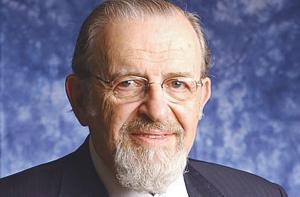Norman Lamm Cites Mistakes As He Retires from Yu
By Steve Lipman
Nearly seven decades after he first entered Yeshiva University as a student, five decades after he began teaching at the school, 37 years after he became its president and a decade after he stepped down from that post, Rabbi Norman Lamm this week retired from his last, mostly ceremonial, position at YU. In an open letter which acknowledged that it was being written with the help of family, Rabbi Lamm, 85, who has been in failing health, announced that he is ending his service as chancellor and rosh ha yeshivah in accordance with an agreement reached three years ago with YU officials. The rabbi alluded in the letter to the controversy that became public knowledge six months ago over alleged cases of sexual abuse at the YU high school for boys in the 1980s, an incident that has tarnished his reputation in the twilight of his career. “At the time that inappropriate actions by individuals at Yeshiva were brought to my attention, I acted in a way that I thought was correct, but which now seems ill conceived,” Rabbi Lamm wrote in his six-page open letter. “I understand better today than I did then that sometimes, when you think you are doing something good, your actions do not measure up. You think you are helping, but you are not. “I recognize now,” the rabbi wrote, that decisions he made in the 1980s risked undoing his earlier accomplishments “because of a few well intentioned, but incorrect moves. And when that happens — one must do teshuva [repentance]. So, I too must do teshuva. “We must never be so committed to justifying our past that we thereby threaten to destroy our future. It is not an easy task. On the contrary, it is one of the greatest trials of all, for it means sacrificing our very egos, our reputations, even our identities,” he wrote. “But we can and must do it. I must do it, and having done so, contribute to the creation of a future that is safer for innocents, and more ethically and halachically correct. “True character requires of me the courage to admit that, despite my best intentions then, I now recognize that I was wrong,” Rabbi Lamm’s letter continued. “This is what I am modeh [acknowledge] as I reflect on my tenure.” Rabbi Lamm acknowledged to The Forward last December that he chose to deal with the allegations against two rabbis, an administrator and teacher, at the high school privately rather than go to the authorities. “In those days,” before accusations against Catholic priests and well-known figures like the former Penn State assistant football coach Jerry Sandusky raised the visibility of the sexual abuse issue, “there was a lack of awareness about and sensitivity to this kind of misbehavior in the Jewish community and the community-at-large,” noted William Helmreich, professor of sociology at the City University of New York and the CUNY Graduate Center, and author of “The World of the Yeshiva” (MacMillan, 1982, reissued by Ktav in 2000). He added that the controversy will “cloud” but not “define” Rabbi Lamm’s career. “That’s not his legacy. “At Yeshiva University, he was the last of a generation that is no more” — someone equally versed in secular and traditional learning, Helmreich said. “One hundred percent modern, 100 percent Orthodox, he was a living role model for the students at Yeshiva University.” Richard Joel, Rabbi Lamm’s successor as YU president, praised the rabbi in a statement “for his half-century of service. … During his tenure he helped guide the university with steadfastness and vision. Dr. Lamm’s contributions to the Jewish world as a distinguished rabbi, philosopher and scholar are unparalleled.” Rabbi Lamm, who assumed the YU presidency in 1976 after serving for 17 years as spiritual leader of the Jewish Center in Manhattan, was credited with rescuing the university from financial straits, combining the skills of a prolific fundraiser with the acknowledged background of a scholar. He was the voice of Modern Orthodoxy on a wide range of halachic issues for decades. Joel, a veteran and respected administrator who had served as president of Hillel: The Foundation for Jewish Campus Life before taking the YU position, is not a rabbi. The position of rosh ha yeshiva — pre-eminent halachic decisor for the institution — will remain unfilled for now, and some note that it has not been fully functional since Rabbi Bernard Revel held the title more than seven decades ago. YU officials note that the various rebbeim, or rabbinic faculty, in RIETS (Rabbi Isaac Elchanan Theological Seminary) reflect a variety of halachic and scholarly views. Most of Rabbi Lamm’s letter, which he refers to as marking the end of his “official affiliation with my beloved Yeshiva University,” is a warm reflection on the influence the institute had on his life. “Yeshiva University is not only an institution,” he wrote. “It is a faith, a vision, a dream, a destiny. Contact: steve@jewishweek.org
|
.
Any original material on these pages is copyright © BishopAccountability.org 2004. Reproduce freely with attribution.
